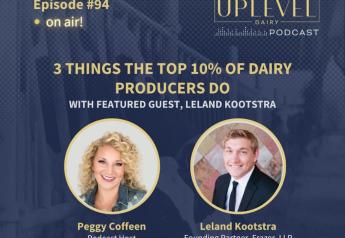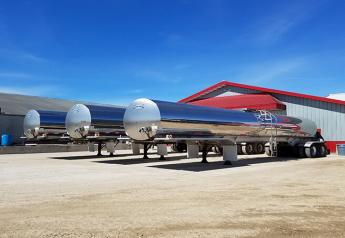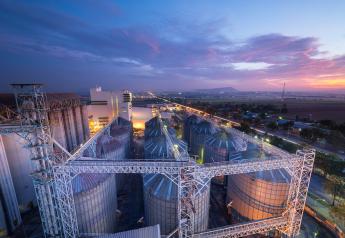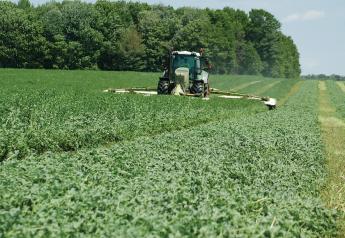Wisconsin Group Takes Issue with Dairy Security Act

Source: Wisconsin Dairy Business Association
Marin Bozic of the University of Minnesota presented research this week that shows the Dairy Security Act is even more concerning to dairy farmers than previously reported.
Last week, Bozic confirmed that the proposed alternative of stand-alone margin insurance without supply management controls, is more fiscally responsible, more sensitive to farm-level decision making, and brings considerably less government intrusion.
In a presentation Monday at the National Dairy Producers Conference, Bozic's analysis of the impact of the Dairy Security Act-although not shown in a comparison with the supply-management-free alternative-- indicates that margin insurance without supply controls at almost all levels is better for dairy farmers than the Dairy Security Act. Small farms in particular do better without a supply management program. At the base levels of coverage, fees are higher and penalties are greater under the Dairy Security Act than under the Goodlatte Scott alternative (see attached comparison for 150-cow farm; both presentations are available on Bozic's home page.)
"The stabilization program in DSA is so complex and any analysis is so full of assumptions, that it is more difficult, not less difficult, for dairy farmers to make a responsible decision," said Jerry Meissner, president of the Board of Directors for the Wisconsin Dairy Business Association.
Bozic, an Assistant Professor in Dairy Foods Marketing Economics in the Department of Applied Economics, spoke at both the Minnesota Wisconsin Dairy Policy Conference in Rochester MN, presenting Dairy Programs in the 2013 Farm Bill: Economic Analysis and Farm-level Impacts and at the National Dairy Producers Conference in Indianapolis today, presenting Dairy Programs in the 2013 Farm Bill: How would they work for your farm?
In the current version of the Farm Bill, if dairy farmers want to participate in a margin, or risk insurance program, they would have to agree to participate in the Dairy Market Stabilization Program. Under this controversial provision of the Dairy Security Act, the government would periodically impose limits on milk production: Dairy farmers would either have to decrease production when margins fall too low, or pay a stiff penalty.
A bipartisan compromise amendment offered in the House Agriculture Committee last year by Reps. Bob Goodlatte (R-VA) and David Scott (D-GA) would have removed the stabilization provision, and also would provide dairy farmers with the ability to obtain margin insurance, with catastrophic coverage, as a risk management tool for times of low milk prices and high feed costs. The proposal is expected to be offered as a bill in advance of the House and Senate mark-up of the Farm Bill at the end of April.
Mark Stephenson, Director of Dairy Policy Analysis at the University of Wisconsin, Madison and part of the academic team which developed this farm level analysis, wrote last summer that if margin insurance were not tied to stabilization penalties, the base level of catastrophic insurance proposed would be very attractive to dairy farmers as they would pay zero, never be penalized, and still enjoy the margin protection. These results were confirmed by the new farm level analysis which showed that for farmers who enrolled in the "free" catastrophic insurance, a 150-cow farm would be penalized by the DMSP at $3,602, assuming milk is not produced. Similarly a 3,000-cow farm would be penalized at $83,349 for milk that is not delivered to the manufacturing plants.
The new analysis shows that the Goodlatte Scott proposal provides the same catastrophic coverage at no cost to more than 90% of all U.S. dairy farms, but would never require dairy producers to reduce their milk production or see deductions in their milk checks go to the federal government.
For the other 10% or so of dairy farm operations, Goodlatte Scott offers the option to purchase catastrophic coverage at a very modest cost, and supplemental coverage at premium rates very similar to the House and Senate bill, again without ever having to either reduce their production or else see deductions in their milk checks go to the federal government.
"This research points out the obvious inconsistency in the DSA," said Laurie Fischer, DBA Executive Director. "On the one hand, you have the government making generously subsidized payments to dairy farmers to protect their risk, and on the other hand, you have the government enforcing payment reductions from farmer's milk checks through the stabilization program. This is excessive and bad public policy that dairy farmers should oppose. The DSA will encourage over production and significantly reduce the level of commercial-market hedging that is working well for many in the industry."
About DBA
The Dairy Business Association is an industry organization comprised of dairy producers and allied industry supporters. DBA promotes the growth and success of all dairy farms in Wisconsin by fostering a positive business and political environment. For more information about DBA, please visit our website at www.widba.com.







